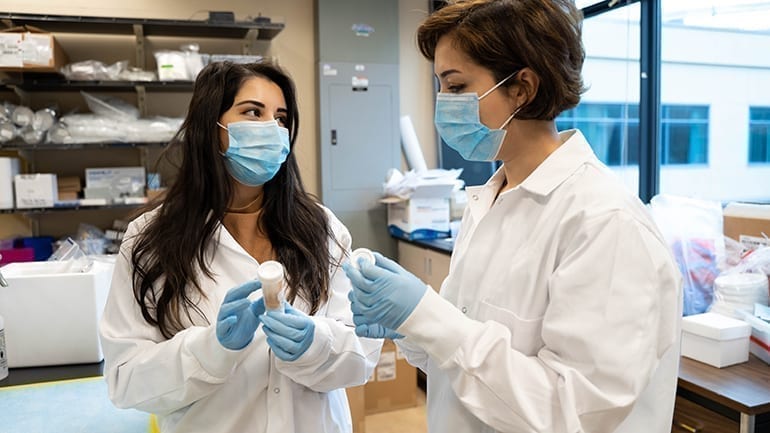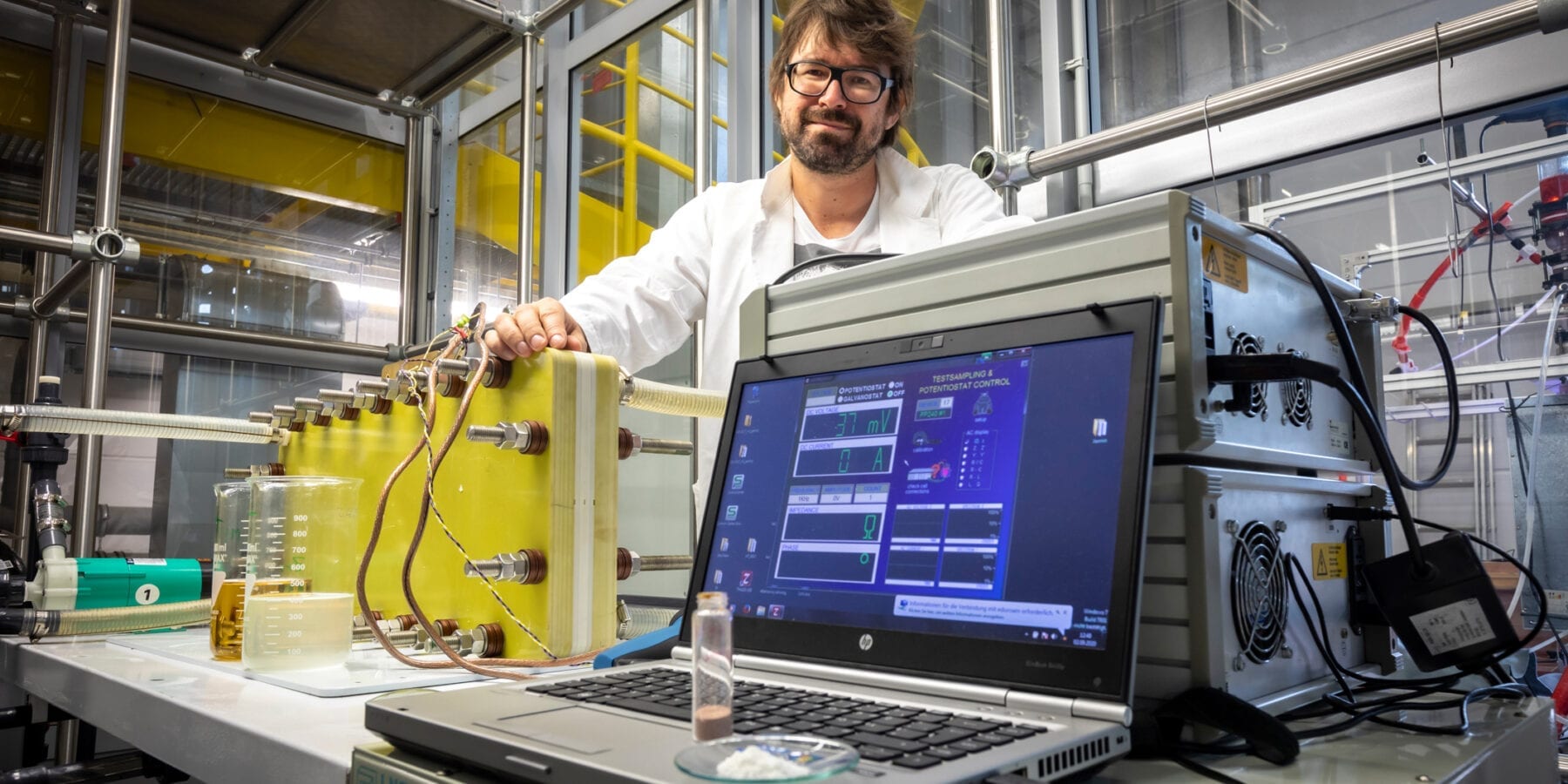
Photo caption: UBCO researchers Negin Kazemian and her supervisor, Assistant Professor Sepideh Pakpour, are investigating the internal dynamics of fecal matter donors and recipients to determine the effectiveness of the therapy.
Genetic analysis helps ensure successful fecal microbiota transplants
Could number two be number one when it comes to combating recurrent Clostridium difficile (CDI) infections?
Using genetic material analysis and machine learning, UBC researchers have pinpointed several key factors to ensure successful fecal microbiota transplants (FMT), which have proven successful in treating bacterial infections in the gut including illnesses like C. difficile, Crohn’s Disease, Colitis and even obesity, explains lead author Negin Kazemian.
“This therapy is still in its infancy, but studies like ours are helping identify key contributors to its overall success,” says Kazemian, a graduate student at UBC Okanagan’s School of Engineering.
Kazemian and her supervisor, Assistant Professor Sepideh Pakpour, are investigating the internal dynamics of both donors and recipients to set out a formula for the effectiveness of the therapy. C. difficile is one of the most frequently identified health care-associated infection in North America, she adds. Once a patient gets it, the illness often recurs, making a significant negative impact on a patient’s gut microorganisms.
Kazemian explains that severely damaged gut ecosystems, like someone who has had C. difficile, are not self-renewing. Therefore, FMT can help by restoring damaged systems through the recreation of the original ecosystem, or the construction of an entirely new and alternative ecosystem.
“In our study, we showed that the success of gut ecological recovery through FMT is dependent on several factors, including the donor gut microbiome—the presence of specific bacteria—as well as the recipient’s pre-FMT gut community structures and the absence of specific bacteria and fungi.”
Some previous studies have pointed to the possibility of “super” donors, but these new findings indicate the relationship between donors and recipients is much more complex. Pakpour says the notion of the super-donor is oversimplified due to the observed short-term fluctuations. A recipient’s microbiota may be just as important to consider when predicting treatment outcomes, especially in unbalanced conditions such as ulcerative colitis.
“Take, for example, blood transplants where we have a strong understanding of the four main blood groups or types, and how they interact with one another,” says Pakpour. “With fecal transplants the research up to this point has not been as clear in what constitutes a good match or compatibility.”
Working with data from the University of Alberta Hospital, Kazemian and Pakpour analyzed the gut composition and DNA from samples extracted before and after FMT.
According to Kazemian, their findings indicate that there isn’t a “one stool fits all” approach to ensure transplant success.
“The data illustrates that the unique microorganisms in everyone’s bodies respond differently over time, and this has profound implications on whether these transplants work well or not.”
The researchers suggest that preparing donors and patients’ gut ecosystems prior to transplant, maybe by using metabolites, would potentially sync their microbiota leading the way to a higher probability of transplant success.
The Latest Updates from Bing News & Google News
Go deeper with Bing News on:
Fecal microbiota transplants
- Viruses Keep Mice from Stressing Out
1-3 However, most studies focus on the bacterial component of the microbiota ... fecal samples from mice prior to exposing them to an aggressive cage mate as a stressor. They isolated the viral ...
- Can Vitamin D Improve Cancer Immunotherapy?
Your diet could impact your cancer treatment’s progress; a new preclinical study suggests more vitamin D could improve responses to checkpoint inhibitors.
- Auto-Brewery Syndrome: The Hidden Challenge Within the Body
Auto-Brewery Syndrome (ABS), a rare condition where the body internally produces alcohol that resembles intoxication. Learn about its origins, symptoms, and treatment options.
- Microbiota Therapeutics Could Become Strong Ally in IBD Treatment
Microbiota therapeutics, such as fecal microbiota transplantation (FMT), could offer more diverse, personalized treatment options for patients with inflammatory bowel disease (IBD), particularly for ...
- Fecal Transplant Shows Promise for Easing Inflammatory Bowel Disease Symptoms
For the study, scientists reviewed results from 15 clinical trials that tested fecal microbiota transplants (FMT) — when stool with healthy microorganisms is inserted into a sick patient’s digestive ...
Go deeper with Google Headlines on:
Fecal microbiota transplants
[google_news title=”” keyword=”fecal microbiota transplants” num_posts=”5″ blurb_length=”0″ show_thumb=”left”]
Go deeper with Bing News on:
Gut ecological recovery
- Recovery vs Response
Recently, in psychopharmacology, this issue has been discussed in the context of the difference between response and recovery. More and more, we find ourselves discussing what we need to do to ...
- 'Gut and replace' bill deals with emergency Maui recovery funding
State senators are pushing a bill that would fund and govern a Maui wildfire death and injury compensation fund. House Bill 679 would appropriate $65 million to the One Ohana Fund. Shown here, a ...
- Tropical forests can't recover naturally without fruit eating birds
The forest is also one of the most important regions on the planet for large-scale ecological restoration, with 12 million hectares of land targeted for restoration and natural recovery under the ...
- How to Start Healing Your Gut in 4 Easy Steps
Your gut may be a portal into other aspects of your health. Here's how to get yours on the right track. Jessica is a writer on the Wellness team with a focus on health news. Before CNET ...
- Past Leadership Meetings
There were 31 passionate SEEDS students and alumni leaders from all over the country who participated in this meeting themed “Ecological Recovery and Prevention of Environmental Disasters: Harnessing ...
Go deeper with Google Headlines on:
Gut ecological recovery
[google_news title=”” keyword=”gut ecological recovery” num_posts=”5″ blurb_length=”0″ show_thumb=”left”]










